Policy News Roundup – Will they reform foreign aid before it implodes?
Foreign Aid Reform: In a recent Huffington Post article, Carol Peasley writes about the “what next” of foreign aid reform, beyond giving development a stronger voice in the larger policy discussions. She asks: how can we make aid more effective through greater local ownership- what would that look like, in terms of process and funding? She also says that much of the discussion about USAID reform has become “contractor bashing,” which is not constructive.
House Foreign Relations Committee Hearing, Combating Climate Change in Africa, next Thursday, April 15th. See the live webcast on the House website.
The collapse of aid? Owen Barder, author of the insightful and sometimes controversial blog Owen Abroad, writes about the “coming collapse of the development system.” In sum, he writes that aid has become more and more complex, and based on the literature, complex systems are bound to fail when they are too rigid to change.
Global Jam: USAID held its first ever “jam” called Global Pulse last week, and the number of participants from around the world was impressive – 11,000 “jammers” from 150 countries, according to an article on the virtual event by Devex.
Blogger Chris Blattman remarks on the fact that there is a “market for everything,” even in pretty harsh conditions. Like manicures in a Haitian tent camp. See the feature presentation on PBS.
The Bad Old Days Were Better, in Zimbabwe: Kristof writes in the NY Times about how badly President Mugabe has destroyed Zimbabwe: people are nostalgic for the good old days of living under the rule of a nasty, oppressive regime run by a tiny white elite.
How to Find Foreign Aid Data
No matter what your specific area of work, if you’re in the global development field, at some point you will probably need to find data on foreign aid. Maybe you work for a small NGO considering a new venture, in say, Cambodia, and you want to know what other similar types of projects are happening there. Maybe you are looking for funding for a project in Namibia, and you want to know which donors currently fund the most work there. Or maybe you are writing an article about aid effectiveness and you want to see which country attracts the majority of U.S. foreign aid, compared with other large donors.
Here is a quick breakdown of the data sources out there, what kinds of information they have, and how to use them. You can find all of these sources and more listed on our website, under the “Resources” tab, and “Policy” under “Issue Areas.”
The OECD DAC Statistics
The OECD’s Development Assistance Committee (DAC) collects aid data from OECD members and non-members, and is considered the most reliable source of aid data. Other databases rely on OECD data. The DAC includes grants and concessional loans, but does not include payments made to individuals, military aid, or loans that must be repaid within one year. For more general information about DAC statistics see this factsheet.
How does it work? I recommend using the QWIDS interface, or Query Wizard for International Development Statistics. When you open the link to this interface, you can choose donors, recipients, types of aid flows, sectors, and time period (2008 is the most recent year available). You can get really specific and only look at disbursements of grants for technical cooperation projects in a certain sector, like teacher-training. Once you hit “display the data” you’ll see a chart with some of the data choices you selected- the rest will be visible by toggling the options at the top of the chart. You can also change the layout of the chart. You can see a breakdown of aid by project, by clicking on the dollar amount in the results. This gives the name of the agency funding the project, along with a short description of the project which usually gives at least an idea of what sector the project is in.
AidData
AidData is a new source for development finance information. It is based mainly on OECD data, but it includes more detail and cross-references the data with information from other sources. It is a more graphical and somewhat more user-friendly interface. According to their website, AidData plans to include aid flows from non-governmental sources, such as NGOs, in the near future. So far there is no compilation of such data anywhere, so this would be useful.
The nice thing about AidData is the way the results are presented- it is much more intuitive and very easy to find whatever specific information is available. AidData still runs into the same problem as the OECD though, a lot of information just isn’t available, probably because it’s not reported.
Foreign Assistance Congressional Budget Justification (FY 2011)
What if you need more current data for U.S. foreign assistance to a particular country? What if you want to compare congressional appropriations with actual disbursements? And what if you are interested in military aid, and other types of aid not considered by the OECD? Then you might turn to the Congressional Budget Justification, or the CBJ as it is called. There is no database, and no fancy online query to fill out, just lots of paper to wade through. However, the State Department puts the most useful tables on foreign assistance together in one document, the Foreign Assistance tables, found here. For comparison of U.S. assistance to recipient countries, tables 2a through 4 are the most useful. Before you dive right into the material, you should at least look at the acronyms on page vii, which lists all of the different accounts used by Congress. These accounts are known by their acronyms, like ‘DA’ for development assistance and ‘ESF’ for economic support fund. To make matters more confusing, these accounts are not really used by the State Department and USAID except to request money from Congress- some programs use funding from multiple accounts, if necessary. There is a different chart for each year, starting with actual funds committed in 2009, estimated commitments in 2010, and the Presidential request for the international affairs budget in FY 2011. There are also special charts that track funding in areas of special interest to Congress, such as Basic Education and Microenterprise.
If you are looking for more detailed information than can be found in these handy charts, you may want to wade through Volume II of the Foreign Operations CBJ, where you will find lots of detailed information about various U.S. foreign assistance programs.
I wish you good luck on your quest for foreign aid data. If you know of any other good sources, or if you have any questions, please let me know in the comments.
Policy News Roundup – March 30, 2010
Posted on March 30, 2010.
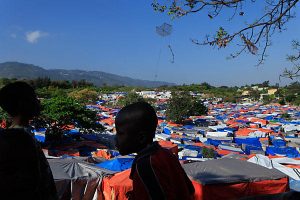
A makeshift camp for earthquake survivors in Port-au-Prince
Haiti:
United States Will Take a New Approach to Aid in Haiti
Secretary Clinton is expected to outline plans for an additional $1 billion in aid to Haiti at the upcoming UN donor conference. U.S. assistance to Haiti will have one dramatic difference over past aid: this time, U.S. officials plan to work through the Haitian government, rather than around it. They have plans to implement major aid projects through the government while building its capacity, instead of working mainly through local NGOs and other groups. This new approach may increase local ownership and government accountability in Haiti.
Donor Countries Will Meet at the UN in New York to discuss decentralization as a Key to Haiti’s Recovery
World leaders at Wednesday’s UN conference on Haiti will be looking at a new focus on decentralizing Port-au-Prince in hopes of fulfilling long-terms needs after immediate needs are met. They plan to look beyond basic relief and discuss not just how to rebuild, but how to build a better functioning Haiti. The idea of decentralizating power in Port-au-Prince is a strategy that will be considered for a more stable Haiti.
Foreign Aid Reform:
Where is the QDDR?
The State Department was supposed to release the initial findings from its strategic review on development, known as the quadrennial diplomacy and development review (QDDR), sometime in March. But now the release is set for “early April,” though there won’t be a public release until after a round of congressional briefings. This is not the first time the QDDR’s release of initial findings has been set back, and there is no guarantee that we will see anything from the State Department in the month of April. Unfortunately, this slows down the whole foreign aid reform process, as other reform efforts underway, such as the White House review (the PSD-7) and legislation in Congress (the Kerry/Lugar bill) are on hold until the QDDR findings are out.
New Online Tool Aims to Comprehensively Track Global Aid
A new online information portal on aid aims to improve transparency and prevent misuse of billions of dollars in international aid. The tool, AidData, pulls together facts and figures from existing databases, donors’ documents, and other online resources. About 837,000 projects are currently listed on the database, which reports official development aid as well as loans. The tool gives more details about each project and provides information on new sectors such as funds provided by 36 under-reported bilateral and multilateral donors. The goal for the project is to give donor and recipient governments, civil society organizations, beneficiaries, aid experts and the general public a fuller picture on who is funding what globally. Founders of AidData include the Bill & Melinda Gates Foundation.
New Study on the Costs and Benefits of Duty-Free, Quota-Free Market Access for Poor Countries
The Center for Global Development released a new study on the costs and benefits of providing full market access for least-developed countries. The study finds that Malawi and Cambodia would benefit the most under most scenarios, and most African LDCs would make small gains. The only African country to suffer from preference erosion would be Madagascar- surprisingly, Mauritius, South Africa, and Central America show small gains even though they would not directly benefit from this market access.
USAID Announces New Global TB Strategy
USAID Administrator Rajiv Shah declares a new strategy to fight tuberculosis on a worldwide scale. In accordance with the President’s Global Health Initiative, USAID is accelerating their programs to control TB. Their goal is to halve the number of TB cases and deaths by 2015. In support of these global targets, USAID released the U.S. Government’s Global TB Strategy that describes their blueprint for expanded treatment and control over the next five years.
The International Monetary Fund Has Traded its Dogmatism for Pragmatism
After six decades of zealously promoting free market economic policies, the International Monetary Fund has changed its view on international trade and development. For years, governments that dared to challenge the IMF model found themselves out of favor in Washington and other Western capitals. But the financial crisis that swept the planet in 2008 prompted a new debate over free market policies and IMF ideology. Now, in a notable turnaround, the IMF has acknowledged that in some instances, developing countries might benefit from controlling how much foreign capital enters their economies — and how it’s used. The new IMF view is summarized in an official paper published last month, “Capital Inflows: The Role of Controls.”
Africa:
A New Strategy to Stimulate Africa’s Development
Many investors are afraid of doing business in Africa because of high political risks. This is where the African Trade Insurance Agency (ATI) comes into play with a unique strategy to stimulate development through trade and investment by reducing political and credit risk.. The ATI is Africa’s only multilateral political risk and credit risk insurance agency. To join, African countries must sign a participation agreement and subscribe for at least 75 shares, each valued at $100,000. Member states are on the hook for any action or inaction that results in ATI paying claims. Since 2004, ATIhas managed to secure $1.9 billion in investments across its member states, which includes the Democratic Republic of Congo, Kenya, Malawi, Rwanda, Uganda, and others. For more details on ATI please click here.
Tunisian Authorities Try to Gag Human Rights Watch’s Report
Human Rights Watch accused Tunisian authorities of using police to prevent journalists from attending the organization’s launch event for a report that criticizes the government’s human rights record. A HRW employee said police had surrounded the lawyer’s office where the group was trying to brief reporters about its new report, which accuses Tunisia of adopting repressive measures toward former prisoners. Tunisia, which attracts large sums in investment from EU countries, wants the European Union to grant it “advanced status,” which could give it preferential trade terms. However, diplomats say concerns about Tunisian’s human rights record risk complicating the application.
Policy News Roundup – March 23, 2010
Posted on March 23, 2010.
Foreign Aid Reform:
Bill Clinton and Bill Gates come together in foreign aid request
Former president Bill Clinton and Bill Gates called on US lawmakers to boost foreign aid to fight diseases like HIV/AIDS and malaria in the world’s poorest nations. They went to Capitol Hill to boost support for the so-called Global Health Initiative (GHI) and promote a crucial health aid budget bill proposed in 2009 by President Barack Obama’s administration. Taking into account the current economic situation, Clinton said the proposed US contribution was carefully developed for maximum impact and followed logically from existing US contributions to the PEPFAR program — the President’s Emergency Program for AIDS relief.
IGD proposal recommends integrating trade and aid to promote African development
IGD joined with a number of business associations, development organizations, think tanks and companies to endorse a recent white paper on trade and development in Africa. This paper is being broadly distributed to policymakers and was submitted as written testimony for a recent Senate Finance Committee hearing to review U.S. trade preference programs.
The white paper outlines four proposals: make critical improvements to trade policies to encourage trade with and within sub-Saharan Africa, establish a mechanism for coordinating trade and development policies, use targeted capacity building and development assistance to increase Africa’s capacity to trade, and use a “Whole of Government” approach that integrates trade, foreign aid and investment policies.
World Water Day:
Yesterday was World Water Day. Quick facts: “World Water Day is celebrated each year on March 22. The annual commemoration of international activities dedicated to addressing global water challenges builds on a series of recommendations made by delegates to the 1992 UN Conference on Environment and Development, held in Brazil. Following the conference, the UN General Assembly declared March 22 to be the World Day for Water. In 1993, the United Nations began inviting countries to organize annual activities to raise the profile of work focused on the implementation of UN recommendations and the achievement of internationally agreed goals regarding water.” 10 percent of the global burden of disease can be credited to water.
Senate Committee to Vote on Clean Drinking Water Bill
The Senate Foreign Relations Committee was scheduled to vote on the Paul Simon Water for the World Act today, March 23rd. However, according to the committee’s website today’s business meeting has been postponed. Senators Patty Murray and Maria Cantwell are both cosponsors of this bill, which would bring safe drinking water to 100 million people. You can find links to more information about this bill on the Global Washington legislative index, Global Health section. Other Senate Foreign Relations Committee business of interest on today’s schedule included the Peace Corps Improvement and Expansion Act, and the nominations of Elizabeth Littlefield for Overseas Private Investment Corporation President and Carolyn Radelet for Peace Corps Deputy Director.
New charity to aid Haiti recovery efforts by providing drinking water
“Unshaken” is a NY-based fundraising campaign to help Haiti recover from the earthquake by providing people with access to clean, safe drinking water. Their goal is to raise at least $1.3 million, funding 11 large-scale water projects which will serve more than 40,000 people in need. 100% of all donations will directly fund water projects in Haiti.
UN Secretary-General Ban Ki-moon: “More people die from unsafe water than from all forms of violence, including war”
Since 2005, the United Nations and other multilateral groups have prioritized water as an important focus for development assistance. In keeping with this priority, the Millennium Development Goals (MDGs) and other internationally-agreed upon goals include water-related issues. A United Nations Water Program 2010 report, “Clearing the Waters: A focus on Water Quality Solutions” calls attention to the importance of clean water as an international development goal. The Secretary-General reiterated the importance of water conservation and sanitization when he said, “day after day, we pour millions of tons of untreated sewage and industrial and agricultural waste into the world’s water systems. Clean water has become scarce and will become even scarcer with the onset of climate change…”
The Story of Bottled Water
The US advocacy group Corporate Accountability International used World Water day to tell people to stop buying bottled water. They stress: bottled water isn’t better than tap water, and the plastic bottles often aren’t recycled.
Ship made From Reclaimed Plastic Bottles Sets Sail
On March 20th the Plastiki, a unique 60ft catamaran engineered from approximately 12,500 reclaimed plastic bottles and srPET, set sail on a journey of more than 11,000 nautical miles. The Plastiki crew want to draw attention to the health of our oceans, in particular the colossal amounts of plastic debris, by showcasing waste as a resource and demonstrating real world solutions through the design and construction of the Plastiki.
Other Development News:
“Quiet Corruption” – African Development Indicators 2010
This year’s Africa Development Indicators essay sheds light on a different type of corruption—what the authors call “quiet corruption”—when public servants fail to deliver services or inputs that have been paid for by the government. The most prominent examples are absentee teachers in public schools and absentee doctors in primary clinics. Others include drugs being stolen from public clinics and sold in the private market as well as subsidized fertilizer being diluted before it reaches farmers.
A leaked UN report says that up to half of Somalia food aid is stolen
The UN report says that up to half of food aid – valued at approximately $485 million in 2009 – is being diverted through a corrupt web of partners, contractors, World Food Program (WFP) staff and local armed groups. The coverage expresses outrage at government and charity monies being wasted, or even worse, the use of food aid to fuel conflict and terrorism. The recent information from the report has has sparked heated debate on how aid reaches people in Somalia.
Argentina coin shortage leaving less change for panhandlers
Argentina has had a coin shortage for more than three years. The crisis has turned normally mundane tasks – like buying a newspaper or a snack – into a big hassle. The situation is also leaving the homeless short-changed. Alita Casal, a postgraduate student, says, “People sometimes hesitate handing coins to street musicians and beggars because they are afraid to run out.”
North Korea on the verge of a new famine
Many North Koreans are braving the fences and armed guards in search of food and medical care. The flow of refugees from North Korea has slowed in recent years as Pyongyang has issued shoot-to-kill orders to guards, and China is losing patience with the influx of refugees. Nevertheless, China, nervous about instability across its border, continues to heavily aid North Korea with food and oil. The few who have made it across live in constant fear of discovery. They risked the crossing to survive the famine they believe is now imminent. The crisis they face now is the barren period around April which is believed as the most dangerous period when the risk of starvation becomes high.
Filed under:
Our Blog • Tagged with:
Africa,
Bill Clinton,
Bill Gates,
drinking water,
GHI,
Haiti,
HIV/AIDS,
IGD,
North Korea,
Somalia,
UN,
World Water Day
Haiti Civilians Picking Up Where Official Efforts are Failing
Posted on March 22, 2010.
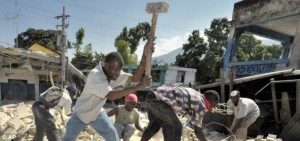
Even with the massive humanitarian response to the January earthquake in Haiti organized by the developed world, the New York Times’ Lawrence Downes reports that the reconstruction effort is failing to meet the needs of all citizens. Security concerns have not been met in some of the sprawling re-settlement camps. Debris and rubble left over from the earthquake has yet to be cleared in order to allow for new construction. Sufficient clean water is not being delivered, and as a result sanitation is suffering. But there is still hope, as Downes contends in his article “Haiti’s Do-It-Yourself Recovery.”
To make up for the lapses in the organized reconstruction effort, the Haitians have taken it upon themselves to rebuild. In most cases, these efforts are exemplary of one of Global Washington’s principles of aid of effectiveness: local ownership of aid projects.
Haitians have organized volunteer patrols to provide safety in areas of refugee settlements not overseen by any United Nations security presence. With the help of a retired engineer, Frantz Liautad, a group of Haitians have begun their own campaign to deliver clean water and food to the refugee settlements, as well as clear debris still left over from the earthquake.
Also, in an effort to increase transparency, coordination and local ownership of aid projects, three of our principles of aid effectiveness, Haitians have created the Civil Society Watchdog Group. The Civil Society Watchdog Group has charged itself with monitoring and evaluating the humanitarian efforts in Haiti to ensure the aid groups are accountable to the Haitian population. In order to strengthen coordination, this group is working to facilitate communication between the organizations and projects responsible for Haitian reconstruction. To promote local ownership, the Civil Society Watchdog Group encourages Haitian citizens to take a more active role in the reconstruction process.
It is encouraging to see that where the top-level efforts have come up short, local citizens are taking it upon themselves to ensure Haiti’s reconstruction. Such a show of commitment and ingenuity is a positive sign that sustainable development can be achieved if the right steps are taken. Using our principles of aid effectiveness as a framework, we can reform the aid process and take the right steps in order to ensure everyone the opportunity to achieve a happy and healthy life.
To learn more about Global Washington’s principles of aid effectiveness, please download and read our white paper.
March 2010 Newsletter
Posted on March 18, 2010.
Welcome to the March 2010 issue of the Global Washington newsletter. If you would like to contact us directly, please email us.
IN THIS ISSUE
Note from our Executive Director
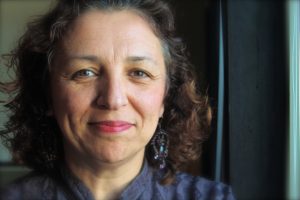 Greetings-
Greetings-
Happy Norooz and happy spring from Global Washington! I hope the extra hour of sunshine at the end of the day is working its revitalizing magic on your spirits.
I am thrilled that so many of you responded to our survey. We gathered a lot of insightful information on how Global Washington can delve deeper into our membership services and programming in order to expand upon and enrich what we offer to the global development community in Washington State. Thank you for contributing your valuable time and your feedback. We are currently in the process of analyzing the data and we will report the results next month in our April newsletter.
March has been an exciting time for Global Washington! We have convened experts to host informative capacity building workshops focused on fundraising, strengthening leadership skills, developing effective communication strategies, and responding to disasters. In the upcoming months, we are bringing together a variety of phenomenal guests from far and wide to engage with our community and contribute to the ongoing dialogue surrounding key global development issues, including an intimate forum with voices from developing world about the effectiveness of foreign aid. We hope you, as a vital participant in Washington State’s global development community, can join us in these opportunities to both learn from experts and share your knowledge with others.
In unity,
Bookda Gheisar, Executive Director
Featured Organization: RenegAID™ – Fostering innovative disaster relief efforts
 When Eunice Stime, a registered nurse, arrived in Mississippi and Louisiana’s Mississippi Delta to assist disaster victims in the wake of Hurricane Katrina, she quickly discovered what it means to confront utter chaos. Expecting to utilize her medical training and expertise, Eunice instead realized that having a vehicle was the most useful asset she could contribute to provide immediate assistance.
When Eunice Stime, a registered nurse, arrived in Mississippi and Louisiana’s Mississippi Delta to assist disaster victims in the wake of Hurricane Katrina, she quickly discovered what it means to confront utter chaos. Expecting to utilize her medical training and expertise, Eunice instead realized that having a vehicle was the most useful asset she could contribute to provide immediate assistance.
“Even though I’m an RN, I needed to go up and down streets and connect survivors and humanitarian staff to relief distribution locations. I had to forget what my college skill was and do what needed to be done,” she said. “Another way to look at it would be to see the entire disaster as an open air hospital and I was doing my nursing rounds.”
Eunice’s observations and experiences in the aftermath of Katrina inspired her to found RenegAID, a nonprofit dedicated to “innovative disaster relief”. Many disaster response efforts, as seen in post-Katrina Gulf Coast/Mississippi Delta, Indonesia, and 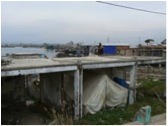 most recently, Haiti, are crippled by the amount of lag time between when supplies arrive, and when they get to survivors. Relief efforts, even when guided by the most sincere intent to help those in need, suffer from chronic logistical problems and muddled distribution strategies that continue to be replicated in disaster areas all over the world.
most recently, Haiti, are crippled by the amount of lag time between when supplies arrive, and when they get to survivors. Relief efforts, even when guided by the most sincere intent to help those in need, suffer from chronic logistical problems and muddled distribution strategies that continue to be replicated in disaster areas all over the world.
To say that collapsed infrastructure, lack of organization and collaboration among governments and response teams, and the ensuing chaos after a disaster are all significant obstacles that contribute to the prolonged delay of distributing food, water, and critical medical supplies to survivors is like a professional bridge builder saying that there was difficulty getting a bridge built because there was a river in the way. Inherent in catastrophic disaster is total chaos and disorder. They can not be used as excuses for our lack of timeliness.
Eunice compares the philosophy behind RenegAID’s mission and operational framework to a Phoenix effect, where loss and regeneration borne out of disaster are like a birth—where survivors simultaneously experience a total loss of identity and a total dependence on a new world reality. Part of RenegAID’s mission is to help equalize the power dynamic between the givers and the receivers of aid in order to reject the idea of aid as charity or welfare and create sustainable solutions.
 “We, as humanitarians, have some words turned around or backwards when we discuss Disasters. The host is not the nation that has experienced a catastrophic disaster. They are the stranger in their own land. A host takes care of and feeds the stranger. We (humanitarians) have been using the word host to refer to a country that is in need of hospitality/hospital care. If the damaged/injured country is truly the host and if the humanitarian world is indeed the stranger, then the damaged/injured country by hospitality traditions should be meeting the needs of the humanitarians. That makes absolutely no sense. If we are ever going to get our humanitarian response right, we need to see ourselves as the host (or hospital).”
“We, as humanitarians, have some words turned around or backwards when we discuss Disasters. The host is not the nation that has experienced a catastrophic disaster. They are the stranger in their own land. A host takes care of and feeds the stranger. We (humanitarians) have been using the word host to refer to a country that is in need of hospitality/hospital care. If the damaged/injured country is truly the host and if the humanitarian world is indeed the stranger, then the damaged/injured country by hospitality traditions should be meeting the needs of the humanitarians. That makes absolutely no sense. If we are ever going to get our humanitarian response right, we need to see ourselves as the host (or hospital).”
RenegAID’s purpose is driven by the humanitarian and pragmatic desire to close the lag time between supply delivery and distribution to survivors and to urge the international community to rethink the current system of disaster response. “We need to get supplies out to individual survivors in the first couple of days. Otherwise there is a tremendous amount of justified anger,” Eunice explains. “We haven’t learned how to do distribution well. We are missing the piece of how to transport supplies to the survivors.”
Part of RenegAID’s strategy for streamlining supply distribution post-disaster is the organization’s Ready-to-Go Disaster Relief Bicycle Project. Modeled after Dave Schweidenback’s widely successful “Pedals for Progress”, a project that facilitates the shipment of donated bicycles to locations in developing countries worldwide, RenegAID received permission to adopt Schweidenback’s model and refocus the project for disaster areas.
The intent of the Ready-to-Go Bikes Project is to facilitate small shipments of bicycles through existing humanitarian disaster response organizations into disaster zones as part of the initial response, providing alternative emergency transportation for survivors to begin connecting and to find points of distribution which tend to move around every few days. Inexpensive parts and maintenance, easy transport, and no fuel costs make bicycles useful when cars are not even able to maneuver debris and may also provide an opportunity for survivors to support existing shops or start small, local bicycle repair businesses.
RenegAID’s Ready-to-Go Bikes Project addresses sustainability in post-disaster zones, attempting to tackle the issue of how to prevent turning disaster survivors into passive recipients of aid without agency or access to their own income generating opportunities. Without ways to cultivate sustainable economic growth, post-disaster communities languish in protracted displacement and poverty. “We are creating slums with the current disaster response system,” says Eunice.
RenegAID advocates strongly for supporting grassroots efforts to rebuild the local economy, and the organization believes part of the solution for helping survivors regain a sense of power over their own lives is through survivors giving to others who have experienced similar disaster-related trauma. According to RenegAID, this system of giving helps foster “individual  sustainability” that “balances the survivor’s need to give with their need to receive in chaos after disaster.” RenegAID’s “Keeping Hope Alive” projects connect survivors of world disasters to one another, such as the Children’s Blanket Label Disaster Healing Project, where children at Pointe Aux Chenes Elementary School on the Mississippi Delta made labels for blankets that were delivered to children in Indonesia.
sustainability” that “balances the survivor’s need to give with their need to receive in chaos after disaster.” RenegAID’s “Keeping Hope Alive” projects connect survivors of world disasters to one another, such as the Children’s Blanket Label Disaster Healing Project, where children at Pointe Aux Chenes Elementary School on the Mississippi Delta made labels for blankets that were delivered to children in Indonesia.
In addition, RenegAID is currently designing a course at Spokane Falls Community College that offers students the unique experience of attempting to understand catastrophic disaster and the regeneration process from a survivor’s perspective. The goal is that students will be better equipped to handle themselves in a disaster and also respond to others in disaster locations.
For more information on RenegAID’s mission, projects, and partners, please visit: http://www.renegaid.org/drupalsite/?q=node/10
top
Changemaker: Sean Dimond of Agros International
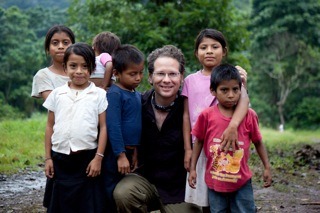
Sean Dimond is a talented and compassionate man who has lived through past life-threatening circumstances to tell a story of beauty and compassion about a world where human dignity is more powerful than war and extreme poverty.
As the acting Director of Communications for Agros International, Sean has applied his diverse background in communications, philosophy, and media-arts to connect the people of the developed world with those suffering in the developing world.
“Agros not only teaches the poor how to fish, but also enables them to own the pond.”
Throughout Central America, rural people have suffered from decades of armed conflict and extreme poverty. Many of these families have been forgotten and left for dead. In most of the developing world, and in Central America specifically, the rural poor depend on land for basic survival. If rural families are able to access their own farmable land, this can create a foundation for food, a secure home, and a path of progress. This is where Seattle-based Agros International comes into the picture.
Agros’ development approach takes into account that while single interventions (such as microcredit or vaccines) are important, in order to sustainably alleviate poverty it is critical to take a holistic approach, or as Agros calls it, “360˚ Development.”
Agros is focused on the long-term alleviation of poverty for entire rural communities by extending long-term loans to purchase farmland, and then partnering with families in applying sustainable agricultural and community development practices. The goal is to empower families to create, develop, and own a thriving, sustainable village.
In summary, Agros does not reduce the causes or solutions of poverty to just the individual, but instead works to alleviate poverty horizontally across an entire community, and vertically so this impact affects future generations.
Rather than build programs based on merely “fixing problems”, Agros seeks to invest in the dreams and values of poor, believing that they have the essential dignity and capacity to work their own way out of poverty.
“Rural poverty is not a statistic. It is a face, a family, a community. And if you first listen and then seek to enable the dreams of the poor themselves, you will be amazed by what they can accomplish,” Sean says.
Sean seems to be destined for international communications. His grandfather was Cherokee Indian and through his legacy Sean developed a passion for rural indigenous people. Having lived in 8 states and 22 cities, and with many opportunities to travel internationally, Sean has a keen sense of inter-connectedness in the world. What’s more, he was influenced by the arts and good communicators and developed a skill for communicating through media. The specific platform for his media skills would end up being decided by fate.
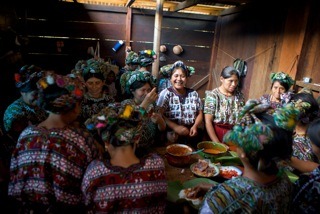
“These families don’t need charity handouts, they need opportunity”
Previous to his work at Agros, Sean owned a creative media firm called “untamed.be” that provided media and marketing communication services to Fortune 500 companies and international NGOs. His success took a turn for the worse when he was later diagnosed with cancer and was forced to close his business. As he struggled through cancer treatment, he continued to pursue one of his passions—music composition. Agros heard about him and hired him to write a score of music for their first promotional video. Sean said that even though this request came during a hard time, he could not say no, “Agros was simply one of a kind.”
After his cancer treatment Sean decided not to go back to his firm, but instead decided to look for work with an international NGO. It was truly serendipitous that at the same time Agros began to look for a Communications Director.
Since the start of his full-time employment with Agros four years ago, Sean has worked to create new fundraising platforms, increase partner engagement, and expand Agros’ visibility through multiple channels. Serving on Agros’ Executive Leadership Team, Sean believes good communications must be driven by an organizations’ strategic plan. With this in mind, he has been able to build a strong communication system for Agros that would tell stories words alone could not accomplish.
“Agros has helped us see our face”
Sean recalls one of his first experiences abroad with Agros: in the mountains of Matagalpa, Nicaragua, in the village of El Eden. It was there during a video interview that he asked a villager to describe Agros in just one word. This villager said, “I would describe Agros as a mirror. Agros has helped us to see our face; they have helped us see that we have dignity. They have helped us to see that we matter.” Sean says it is encounters like this that get him out of bed every morning, focused to help these people help themselves.
“You do a disservice when you oversimplify the complexity of global poverty”
Sean believes that “we live in a unique time in human history—the struggles we face globally have a great deal to do with questions of sustainability, whether it is about food or the environment or basic security–and in an increasingly inter-connected world I feel the work of Agros is especially important.”
Sean asserts that the unique, sustainable solutions such as those practiced by Agros are critical for this global challenge. In addition, he does not think of other organizations in the global development sector as competitors. Agros is one important contributor within the global development field, but so are other organizations in their own way. Sean sees his primary competitor as “ ‘the apathy and resignation’ that exists in the general culture; the sense that nothing will ever change”. Sean believes that lasting change to complex problems is possible, “because here at Agros I get the privilege of seeing it happen every day.”
Furthermore, Sean also believes that connecting with other organizations is critical in this work, and that only by doing so can we learn from each other. It is for this reason that Sean really values Global Washington’s ability to convene the development sector in Washington State, and is excited for Global WA to reach their full potential.For more information about Agros and how its dedicated people are working to make a difference in the world visit:
http://www.agros.org/Submitted by Luke Mohr
top
Global Entertainment: Blessed Unrest: How the Largest Social Movement in History is Restoring Grace, Justice, and Beauty to the World by Paul Hawken
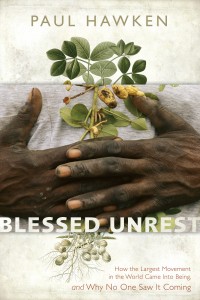 Blessed Unrest: How the Largest Social Movement in History is Restoring Grace, Justice, and Beauty to the World by Paul Hawken (2007)
Blessed Unrest: How the Largest Social Movement in History is Restoring Grace, Justice, and Beauty to the World by Paul Hawken (2007)
Some books are like English gardens, with clear, linear lines that follow formal rules, allowing the reader to see exactly where they are going at all times. Other books take the reader on a journey though an untamed forest where he or she wanders about, delighting in the joy of discovery. Paul Hawken’s book Blessed Unrest is of the latter variety. If the reader can put aside her desire for formal writing and ease into a meandering but fertile narrative, then Blessed Unrest will deliver a sense of hope and inspiration.
The book weaves together environmental and social justice history, poetry, and Hawken’s personal observations in an ambitious attempt to frame what he sees to be a singular global social movement. After years of environmental and social justice activism that brought him into contact with NGOs and social groups around the world, Hawken has come to believe that, though we may not recognize it yet, the multitude of nonprofit and non-governmental groups, educated consumers, green businesses, and concerned citizens around the world are acting in concert to save the planet and ourselves. He writes: “This is the largest social movement in all of human history. No one knows its scope, and how it functions is more mysterious than what meets the eye. What does meet the eye is compelling: coherent, organic, self-organizing congregations involving tens of millions of people dedicated to change.”
Blessed Unrest locates the roots of this global movement in the work of Emerson, Thoreau, Gandhi, Leopold, Martin Luther King, Jr., and Rachel Carson, but also ascribes to the movement such contemporary events as the WTO protests, public responses to the Bhopal disaster and Hurricane Katrina, the Slow Food movement, and the resistance of indigenous peoples around the world to globalization.
While the skeptic may not be convinced by Hawken’s effort weave together the disparate activities of individuals and organizations around the globe, it is nonetheless an ambitious attempt to frame and unify a movement. Indeed, all social movements begin as a collection of independent ideas and actions that, at some point, come together as a recognizable and coordinated movement. The process of unifying often begins with someone framing and naming the movement as Hawken attempts to do here.
In the last two chapters of the book, Hawken leaves us with two powerful analogies for how to better grasp the work and unity of this vast social movement. In one of the analogies, he compares the movement to the human immune system: “ The ultimate purpose of a global immune system is to identify what is not life affirming, and to contain, neutralize, and eliminate it. Where communities, cultures, and ecosystems have been damaged, it seeks to prevent additional harm and then heal and restore the damage.” To deal with the pathogens of environmental degradation and social injustice, “the movement has had to become an array of different types of organizations. There are community development agencies, village- and citizen- based groups, corporations, research institutes, associations, networks, faith-based groups, trusts, and foundations.” Then, in the second analogy, Hawken builds a comparison between the movement and a living organism, which he bases on the work of molecular biologist Mahlon Hoagland. He argues that the two hold in common the following: 1. Life builds from the bottom up: complex organisms are built of cooperating communities of cells, and “the movement to address environmental and social issues has been built up by small, cooperating groups of people; 2. Life assembles itself into chains: so, to, do nonprofits link interests, people, communities, and capital. These interesting and useful comparisons are well worth reading and adding to your global development communications tool kit.
And, as an added bonus, the appendix of Blessed Unrest provides us with a wonderful resource: an exhaustive dictionary and key word list for issues, concepts, and activities that fall under the umbrella of the global movement described by the book. This appendix was made possible by a long-term project at the Natural Capital Institute. Together with the NCI, Hawken has created a global database of civil society organizations that focus on environmental and social justice issues, and a website that aims to “accelerate pubic awareness and increase the ability of the movement to connect and collaborate.” The reader of the Global Washington news letter will no doubt find the resources of such a kindred organization quite useful.
Ketty Loeb, Founder of Wokai Seattle
top
Announcements
- The 17th Annual RESULTS/RESULTS Educational Fund* benefit will be held on April 27, 2010 at the Seattle Design Center: In its 30th year of advocacy, the non-partisan, citizen-driven work of RESULTS is leading the way in engaging Congress to fund proven, effective, long-term solutions to hunger and poverty in the U.S. and throughout the world. RESULTS volunteers advocate for the most effective, successful programs for ending hunger and poverty—programs for basic health, basic education and microcredit. Click here for more information.
- Unitus Names Eliza Linford Kelly Vice President of Global Communications: As part of the organiza
 tion’s ongoing efforts to alleviate global poverty through microfinance, Unitus is proud to announce that Eliza Linford Kelly has been named Vice President, Global Communications.This promotion will see her assume responsibility for crafting Unitus’s global marketing strategy, as wellas providing insightful thought leadership on issues pertinent to the growth of inclusive financial services for the world’s working poor. Kelly will manage a professional communications team spread
across the organization’s offices in Seattle, Bangalore, and Nairobi to see that the organization’s goals are realized.
“We’re thrilled with all Eliza has accomplished since joining Unitus and are very excited to see what she can do in her new role,” said Unitus President Ed Bland. “We find ourselves at a crucial moment in the fight against global poverty, and ensuring that the goal is never far from public view is essential.”
tion’s ongoing efforts to alleviate global poverty through microfinance, Unitus is proud to announce that Eliza Linford Kelly has been named Vice President, Global Communications.This promotion will see her assume responsibility for crafting Unitus’s global marketing strategy, as wellas providing insightful thought leadership on issues pertinent to the growth of inclusive financial services for the world’s working poor. Kelly will manage a professional communications team spread
across the organization’s offices in Seattle, Bangalore, and Nairobi to see that the organization’s goals are realized.
“We’re thrilled with all Eliza has accomplished since joining Unitus and are very excited to see what she can do in her new role,” said Unitus President Ed Bland. “We find ourselves at a crucial moment in the fight against global poverty, and ensuring that the goal is never far from public view is essential.”
- Join leadership gurus Pat Vivian and Wendy Wantanabe for a 5-part capacity building series for Executive Directors: Not an Executive Director? No problem. The content of these sessions will be applicable to anyone in a leadership role, managing a team, or running a department. For more information on the Executive Director series, please click here.
top
Upcoming Events
Click here to see a full list of international development events on the Global Washington’s calendar. Upcoming events include:
Please submit your events to our calendar!
top
contacted 763
businesses, academic centers, nonprofits
and foundations in March and April 2009,
inviting them to complete a survey of their
global development activities.
Of an estimated 763 organizations, a
sampling of 122 met our definition of
global development work based on their
survey responses, including their reported
activities in the developing world and the
kind of issues they reported addressing.
Global Education News – March 17, 2010
Posted on March 17, 2010.
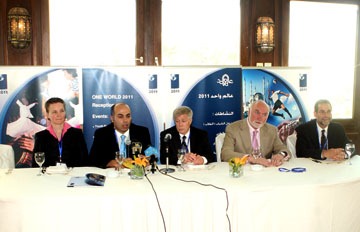
OneWorld launches in Jordan, refer to OneWorld article below for more information. Photo courtesy of OneWorld2011
OneWorld Now!:
One World 2011 events will take place in the summer and fall of 2011 in Seattle, Washington

Photo courtesy of OneWorld2011
Global Washington member, OneWorld Now, is a proud founding partner of OneWorld 2011. One World 2011 is an international cultural, arts, education, medical exchange and sporting event that will build partnerships, and a bridge for cultural understanding between the United States and the Muslim world. In addition, the One World 2011 Medical Conference will be held in Seattle, focusing on health care and research in a global context.
Seattle University:
Seattle University appoints new leader for global engagement initiative
Seattle University has appointed a new associate provost, Victoria Jones, PhD, for global engagement to lead a strategic academic initiative to extend the international reach of the university and advance the global education of its students.
Washington State University:
Southwest Washington Math, Engineering and Science Achievement program (MESA) will host its sixth annual MESA Day on March 20
WSU Vancouver houses, and is a partner of, Southwest Washington MESA. MESA provides enriching educational opportunities that help build a pathway to college and careers in the science, technology, engineering and math (STEM) fields for students who are currently underrepresented in those fields—African American, Latino, Native American, and female.
BRIDGES To Understanding:
BRIDGES offers a one-day workshop for educators on April 17th
BRIDGES is inviting to learn the basics of teaching their students how to produce digital stories about their lives, communities and common global issues, and then share them with their peers around the world.
BRIDGES is seeking international interns
Bridges’ international interns help middle and high school students at partner schools in Peru, India, South Africa or Guatemala and gain greater cross-cultural understanding by learning directly from their peers across the globe through digital storytelling.
EarthCorps:
EarthCorps welcomes new international participants
As part of its mission to build global community through local environmental service, EarthCorps brings emerging leaders from around the world to take part in environmental service programs. International participants live with local homestay families as they restore wetlands, plant trees, and construct hiking trails. Some of this year’s come from: Brazil, Colombia, Guatemala, Kazakhstan, Kenya, Morocco, Russia, and Zambia
US Education:
United States has slipped from second to 14th in graduation rates among the world’s richest countries
The U.S. children of today will be competing in a global economy. That means their education needs to be world-class, which some troubing signs indicate they are not getting. An expert on global education systems told the U.S. Senate earlier this month that the United States has slipped from second to 14th in graduation rates among the world’s richest countries in the past decade – not so much because the U.S. is slipping but because other countries are doing so much better.
New US education report reveals boys are falling behind in reading and writing abilities
Despite the deadlocks regarding global warming, the domestic economy, and health care, Obama is making headway in education reform. His bottom line goal: the United States to have the world’s highest proportion of college graduates by the year 2020. The likelihood of the US jumping from the middle of the rankings of developed nations to the top in just 10 years is not plausible. However, it is drawing attention to further understand flaws in our current education system and those who need help the most. In a report by the nonpartisan Center on Education Policy, an in-depth look at who is and isn’t passing state tests shows gender disparities between males and females. The survey shows that girls tie with boys in math skills. The reading differences, meanwhile, are profound, with boys a full 10 percentage points behind girls. Boys are even farther behind in writing abilities.
Policy News Roundup – March 16, 2010
Posted on March 16, 2010.
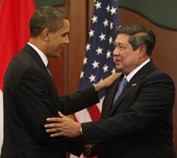
President Obama meets with Indonesia's President Yudhoyono, refer to article below. Photo courtesy of Brookings
Haiti:
Should Haiti be made a UN protectorate? Some say that is the best option for this country whose governance is shaky in the best of times, while others are concerned about taking away its autonomy. Read the debate at a Brookings event here.
Foreign Aid Reform:
Integrating the three D’s: Former USAID Administrator J Brian Atwood spells out how to elevate development assistance in US foreign policy, and what the challenges will be for diplomats, defense personnel, and development professionals.
With the release of initial findings from the State Department’s Quadrennial Diplomacy and Development Review (QDDR) expected very soon, MFAN has launched a blog series to spur debate on the review and its importance to foreign assistance reform and the future of U.S. development efforts. The first post – “Time for Hard Questions on the QDDR” by George Ingram – poses candid questions to keep in mind as we read and respond to the release of the initial QDDR findings. George’s piece will be followed by material from others across the Network on the QDDR, the Presidential Study Directive on Global Development Policy, USAID, country ownership, gender integration, and other reform-related topics.
Other Development News:
President Obama makes symbolic visit to Indonesia
Often described as the most important country in the world that people know the least about, Indonesia welcomed a visit by President Obama. Many feel it is the beginning to placing the country on the map. Furthermore, the “Comprehensive Partnership” that the two countries will formally launch represents the kind of long-term commitment that can go far in helping Indonesia pull its weight in global affairs.
Indonesia urges US to reconsider ban on commando training
Indonesia’s special forces have concentrated on counterinsurgency issues in recent years, but were accused of major abuses in the former Indonesian province of East Timor in the ’90s. As a result, several countries, including the U.S. and Australia, suspended joint military training in Indonesia. The Indonesian Foreign Minister Marty Natalegawa expressed hope that full military cooperation between the two countries could resume. The issue is likely to feature in talks between President Barack Obama and his Indonesian counterpart, Susilo Bambang Yudhoyono, next week in Jakarta.
The Overseas Development Institute launched a report on the key recommendations for ‘fragile states’
The meeting series on Development, Security and Transitions in Fragile States, organised by the Overseas Development Institute (ODI) in partnership with the Dutch Ministry of Foreign Affairs, brought together an impressive array of experienced and respected politicians, analysts, policymakers and researchers from a vast range of disciplines and background. The speakers discussed the nature of fragility, relationships between development and security, and the challenges of supporting transitional and state building processes.
New aid program challenges traditional development community’s beliefs about poor people’s ability to make wise use of cash
Oxfam Great Britain’s “unconditional cash transfers” are cash payments with no conditions other than that it couldn’t be used for alcohol, drugs or gambling. Oxfam’s reviews of the program found that families had used the money to improve their household food security and overall income, School dropout rates decreased, and gender equity in the village improved, with women sharing control of the money.
Former Air Force sergeant asserts foreign development aid is critical to our national security strategy
Will Bennett, former Air Force technical sergeant, spent 12 years engaged in supporting peacekeeping and wartime missions in Bosnia, Kosovo and Iraq. He says despite many tough budget choices ahead it is imperative that Congress maintain U.S. investments in foreign development not only to help prevent vulnerable regions around the world from descending into strife but also to make the American public safer.
U.S. Contributions to Multilateral Organizations
Posted on March 16, 2010.
With the request submitted by President Barack Obama for the FY 2011 International Affairs Budget, much emphasis has been placed on bilateral U.S. assistance programs, namely food security, climate change, and health. But there is another aspect to U.S. foreign assistance that is often overlooked: monetary contributions to multilateral organizations. The importance of providing such assistance is significant. As a leader in the international community, these donations can leverage funding for multilateral organizations from other wealthy nations. Also, these organizations often exemplify Global Washington’s principles of effective foreign aid: coordination, transparency and accountability, local ownership, and targeting aid to those most in need.
As a means to implement these principles on a global scale, the U.S. Government supports two types of multilateral aid organizations in the International Affairs Budget: international organizations and programs and international financial institutions.
Each international organization and program receiving funding from the U.S. has a specific objective to solve problems experienced on a global scale such as climate change, human rights violations, and refugee crises. Organizations that receive U.S. contributions include the International Development Association, The Global Fund to Fight HIV/AIDS, Tuberculosis, and Malaria, the Organization of American States, and a variety of United Nations funds.
The two organizations that receive the most money from the U.S. Government, the Global Fund and UNICEF, are instrumental in delivering effective foreign assistance. While not engaging in implementation, the Global Fund receives and disburses funding from the international community to health programs aimed at those most in need. To ensure sustainable and positive results, each plan is developed by the recipient countries and chosen by the Global Fund on a performance-based system. The performance and results of each program are posted on the Global Fund’s website to make their implementing partners more accountable.
Focusing on child survival and education, UNICEF builds protective environments for children and equips local adolescents with the resources necessary to help their communities during and after national emergencies. Through communication and consultation with local populations, UNICEF promotes the participation of the community in meeting needs. Like the Global Fund, UNICEF posts the results of their programs online in an effort to monitor and evaluate progress for future decisions. UNICEF and the Global Fund are thus incredibly efficient in meeting the core principles of effective aid.
Apart from international organizations and programs, international financial institutions are generally focused on providing economic support in the form of loans and grants as a means to reduce poverty and build infrastructure. These institutions are integral to stimulating economic growth in the world’s poorest countries because they provide high-risk loans that private financial institutions would not make.
It is with this model that the World Bank’s International Development Association (IDA) satisfies a core principle of effective aid: targeting assistance to the people that need it the most. While addressing infrastructure construction, agricultural issues, health concerns, sanitation, and education with its loans, the IDA provides loans with no interest to countries selected by their relative level of poverty. Repayment plans of these loans are extended over a period of 35 to 40 years with a 10-year grace period. In doing so, IDA can be considered an effective tool to encourage and support economic growth in the developing world.
In sum, contributing to multilateral organizations is an effective way to leverage more funding for these organizations and a means by which sustainable development can be achieved.
Below is a list of the top ten multilateral recipients of U.S. funding. For a complete list of the funding levels received by each multilateral organization, please refer to the attached chart. Also, to learn more about the principles of aid effectiveness, read Global Washington’s white paper.
| Top U.S. Contributions to Multilateral Organizations (in $ thousands) |
| Organization |
FY2009 |
FY2010 |
FY2011 Req. |
| International Development Association |
1,115,000 |
1,262,500 |
1,285,000 |
| Global Fund to Fight HIV/AIDS, Tuberculosis, and Malaria |
1,000,000 |
1,050,000 |
1,000,000 |
| Climate Investment Funds |
0 |
375,000 |
635,000 |
| Global Agriculture and Food Security Fund (GAFSP) |
0 |
0 |
408,400 |
| Global Environment Facility |
80,000 |
86,500 |
175,000 |
| African Development Fund |
150,000 |
155,000 |
155,940 |
| UN Children’s Fund (UNICEF) |
130,000 |
132,250 |
128,000 |
| Asian Development Fund |
105,000 |
105,000 |
115,250 |
| Asian Development Bank |
0 |
0 |
106,586 |
Drawing Support for the FY 2011 International Affairs Budget
Posted on March 12, 2010.
As Congress examines and discusses the President’s Fiscal Year 2011 Budget Request, we are about to enter a pivotal three week period in which Congress will set the spending parameters with the annual budget resolution. Engaging now is our best opportunity to ensure that Congress supports the President’s International Affairs Budget. Over the coming weeks it is crucial that key members of the Senate hear from their constituents through phone calls and in-state meetings.
We need our members and supporters to reach out to Senator Patty Murray’s office and ask that she support the International Affairs Budget. Also, we are working with the U.S. Global Leadership Coalition to establish a meeting with the Senator during the coming Congressional Easter recess (March 29th-April 9th). Please let us know if you are able and would like to attend a meeting during this period.
As a member of both the Budget and Appropriations Committees, Senator Murray has a significant role in determining the amount of funding for the International Affairs Budget and influencing other Members of Congress. Assuring Senator Murray’s support of the President’s request will be critical to guarantee a strong International Affairs Budget.


 Greetings-
Greetings- When Eunice Stime, a registered nurse, arrived in Mississippi and Louisiana’s Mississippi Delta to assist disaster victims in the wake of Hurricane Katrina, she quickly discovered what it means to confront utter chaos. Expecting to utilize her medical training and expertise, Eunice instead realized that having a vehicle was the most useful asset she could contribute to provide immediate assistance.
When Eunice Stime, a registered nurse, arrived in Mississippi and Louisiana’s Mississippi Delta to assist disaster victims in the wake of Hurricane Katrina, she quickly discovered what it means to confront utter chaos. Expecting to utilize her medical training and expertise, Eunice instead realized that having a vehicle was the most useful asset she could contribute to provide immediate assistance. most recently, Haiti, are crippled by the amount of lag time between when supplies arrive, and when they get to survivors. Relief efforts, even when guided by the most sincere intent to help those in need, suffer from chronic logistical problems and muddled distribution strategies that continue to be replicated in disaster areas all over the world.
most recently, Haiti, are crippled by the amount of lag time between when supplies arrive, and when they get to survivors. Relief efforts, even when guided by the most sincere intent to help those in need, suffer from chronic logistical problems and muddled distribution strategies that continue to be replicated in disaster areas all over the world. “We, as humanitarians, have some words turned around or backwards when we discuss Disasters. The host is not the nation that has experienced a catastrophic disaster. They are the stranger in their own land. A host takes care of and feeds the stranger. We (humanitarians) have been using the word host to refer to a country that is in need of hospitality/hospital care. If the damaged/injured country is truly the host and if the humanitarian world is indeed the stranger, then the damaged/injured country by hospitality traditions should be meeting the needs of the humanitarians. That makes absolutely no sense. If we are ever going to get our humanitarian response right, we need to see ourselves as the host (or hospital).”
“We, as humanitarians, have some words turned around or backwards when we discuss Disasters. The host is not the nation that has experienced a catastrophic disaster. They are the stranger in their own land. A host takes care of and feeds the stranger. We (humanitarians) have been using the word host to refer to a country that is in need of hospitality/hospital care. If the damaged/injured country is truly the host and if the humanitarian world is indeed the stranger, then the damaged/injured country by hospitality traditions should be meeting the needs of the humanitarians. That makes absolutely no sense. If we are ever going to get our humanitarian response right, we need to see ourselves as the host (or hospital).” sustainability” that “balances the survivor’s need to give with their need to receive in chaos after disaster.” RenegAID’s “Keeping Hope Alive” projects connect survivors of world disasters to one another, such as the
sustainability” that “balances the survivor’s need to give with their need to receive in chaos after disaster.” RenegAID’s “Keeping Hope Alive” projects connect survivors of world disasters to one another, such as the 

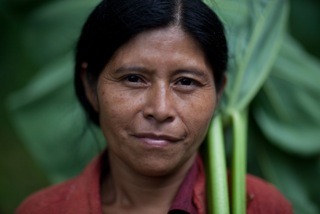
 Blessed Unrest: How the Largest Social Movement in History is Restoring Grace, Justice, and Beauty to the World by Paul Hawken (2007)
Blessed Unrest: How the Largest Social Movement in History is Restoring Grace, Justice, and Beauty to the World by Paul Hawken (2007) tion’s ongoing efforts to alleviate global poverty through microfinance, Unitus is proud to announce that Eliza Linford Kelly has been named Vice President, Global Communications.This promotion will see her assume responsibility for crafting Unitus’s global marketing strategy, as wellas providing insightful thought leadership on issues pertinent to the growth of inclusive financial services for the world’s working poor. Kelly will manage a professional communications team spread
across the organization’s offices in Seattle, Bangalore, and Nairobi to see that the organization’s goals are realized.
“We’re thrilled with all Eliza has accomplished since joining Unitus and are very excited to see what she can do in her new role,” said Unitus President Ed Bland. “We find ourselves at a crucial moment in the fight against global poverty, and ensuring that the goal is never far from public view is essential.”
tion’s ongoing efforts to alleviate global poverty through microfinance, Unitus is proud to announce that Eliza Linford Kelly has been named Vice President, Global Communications.This promotion will see her assume responsibility for crafting Unitus’s global marketing strategy, as wellas providing insightful thought leadership on issues pertinent to the growth of inclusive financial services for the world’s working poor. Kelly will manage a professional communications team spread
across the organization’s offices in Seattle, Bangalore, and Nairobi to see that the organization’s goals are realized.
“We’re thrilled with all Eliza has accomplished since joining Unitus and are very excited to see what she can do in her new role,” said Unitus President Ed Bland. “We find ourselves at a crucial moment in the fight against global poverty, and ensuring that the goal is never far from public view is essential.”

